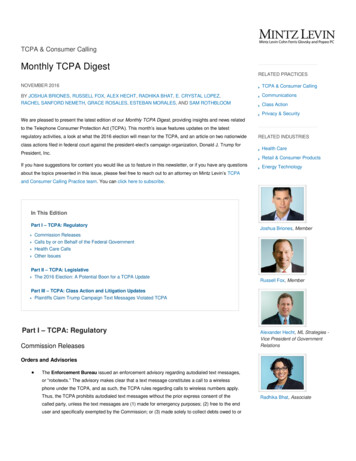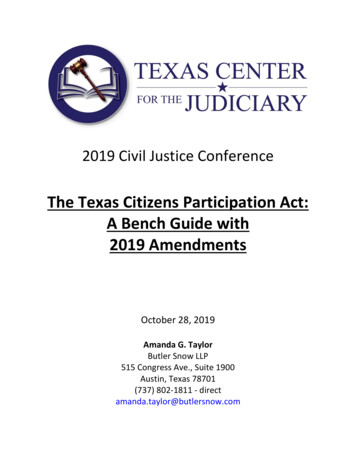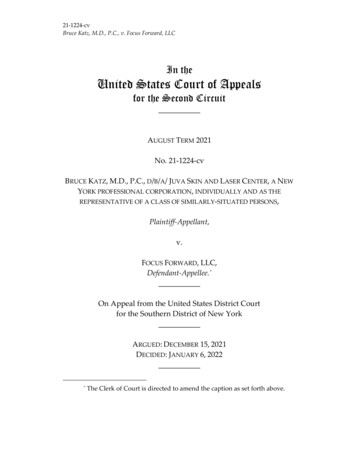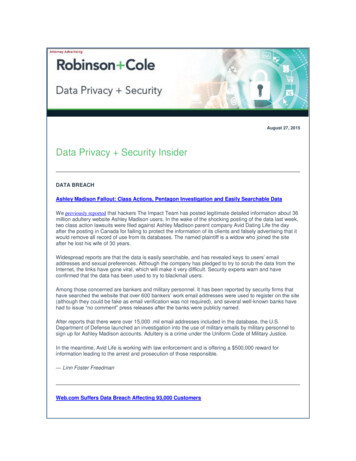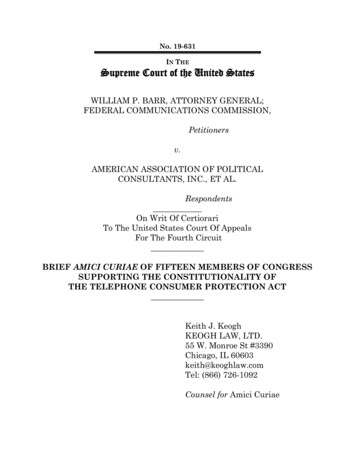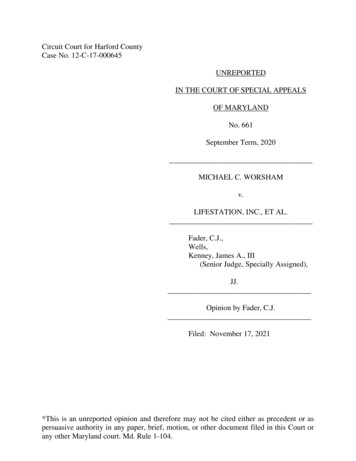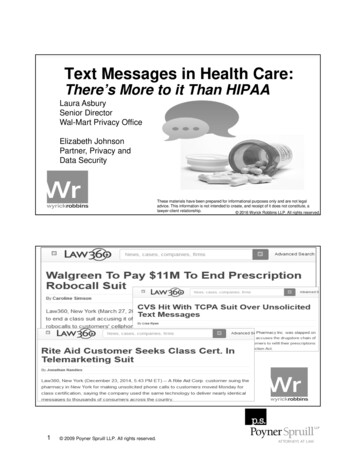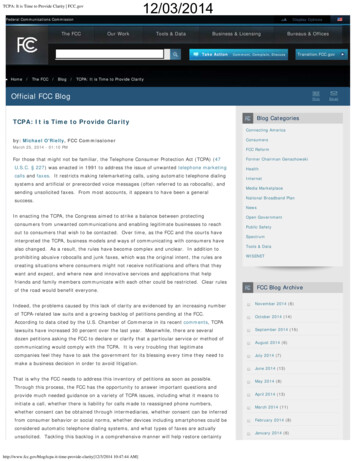
Transcription
12/03/2014TCPA: It is Time to Provide Clarity FCC.govFederal Communications CommissionThe FCCOur WorkSearchTools & DataBusiness & LicensingTake ActionBureaus & OfficesComment, Complain, DiscussTransition.FCC.govHome / The FCC / Blog / TCPA: It is Time to Provide ClarityOfficial FCC BlogPrintBlog CategoriesTCPA: It is Time to Provide ClarityConnecting Americaby: Michael O'Rielly, FCC CommissionerMarch 25, 2014 - 01:10 PMFor those that might not be familiar, the Telephone Consumer Protection Act (TCPA) (47U.S.C. § 227) was enacted in 1991 to address the issue of unwanted telephone marketingcalls and faxes. It restricts making telemarketing calls, using automatic telephone dialingsystems and artificial or prerecorded voice messages (often referred to as robocalls), andsending unsolicited faxes. From most accounts, it appears to have been a generalsuccess.ConsumersFCC ReformFormer Chairman GenachowskiHealthInternetMedia MarketplaceNational Broadband PlanNewsIn enacting the TCPA, the Congress aimed to strike a balance between protectingconsumers from unwanted communications and enabling legitimate businesses to reachout to consumers that wish to be contacted. Over time, as the FCC and the courts haveinterpreted the TCPA, business models and ways of communicating with consumers havealso changed. As a result, the rules have become complex and unclear. In addition toprohibiting abusive robocalls and junk faxes, which was the original intent, the rules areOpen GovernmentPublic SafetySpectrumTools & DataWISENETcreating situations where consumers might not receive notifications and offers that theywant and expect, and where new and innovative services and applications that helpfriends and family members communicate with each other could be restricted. Clear rulesof the road would benefit everyone.Indeed, the problems caused by this lack of clarity are evidenced by an increasing numberof TCPA-related law suits and a growing backlog of petitions pending at the FCC.According to data cited by the U.S. Chamber of Commerce in its recent comments, TCPAlawsuits have increased 30 percent over the last year. Meanwhile, there are severaldozen petitions asking the FCC to declare or clarify that a particular service or method ofcommunicating would comply with the TCPA. It is very troubling that legitimatecompanies feel they have to ask the government for its blessing every time they need tomake a business decision in order to avoid litigation.That is why the FCC needs to address this inventory of petitions as soon as possible.Through this process, the FCC has the opportunity to answer important questions andprovide much needed guidance on a variety of TCPA issues, including what it means toinitiate a call, whether there is liability for calls made to reassigned phone numbers,whether consent can be obtained through intermediaries, whether consent can be inferredfrom consumer behavior or social norms, whether devices including smartphones could beconsidered automatic telephone dialing systems, and what types of faxes are actuallyunsolicited. Tackling this backlog in a comprehensive manner will help restore ide-clarity[12/3/2014 10:47:44 AM]FCC Blog ArchiveNovember 2014 (6)October 2014 (14)September 2014 (15)August 2014 (6)July 2014 (7)June 2014 (13)May 2014 (8)April 2014 (13)March 2014 (11)February 2014 (8)January 2014 (6)Email
TCPA: It is Time to Provide Clarity FCC.govand reduce the need to file additional petitions.12/03/2014December 2013 (7)1The FCC also needs to take a hard look at its own precedent. Some of these prior2interpretations of the TCPA, while well-meaning, may have contributed to the complexityby enlarging the scope of potential violations. For example, the FCC expanded certainTCPA requirements to encompass solicited fax advertisements even though the statute islimited to unsolicited fax advertisements. Specifically, the TCPA makes it unlawful “to useConnectany telephone facsimile machine, computer, or other device to send, to a telephonefacsimile machine, an unsolicited advertisement” unless certain conditions are met. And,even if those conditions are met, the TCPA specifies that the “unsolicited advertisement”must “contain[] a notice” so that consumers are able to opt-out of receiving future faxes.The FCC’s rules, however, require the notice to be provided on all fax advertisements,whether solicited or unsolicited.The TCPA is supposed to protect consumers from unwanted commercial robocalls, texts, orfaxes. The FCC must hold bad actors accountable when they violate this law. But theFCC should also follow through on the pending TCPA petitions to make sure that goodactors and innovators are not needlessly subjected to enforcement actions or lawsuits,which could discourage them from offering new consumer-friendly communicationsservices.Updated: March 26, 2014 - 05:15 PM12CommentsFederal CommunicationsCommission LoginShare Favorite Sort byNewestJoin the discussion Caitlyn@techdealsmag 3 months agoWell, more clarity is needed Elena Reply Share › 3 months agoWhere can I find the full text of the TCPA with all updates? Thank you. Reply Share ›Ken Reagan 3 months agoThank you for post your concerns. I work in the Health Insurance industry andwe're under increased pressure to enroll, engage and solicit Young Invincibles, akey target segment necessary to make Obamacare work. However, TCPAregulations are hampering our efforts to engage this populaton on their -clarity[12/3/2014 10:47:44 AM]Share this page345›»
TCPA: It is Time to Provide Clarity FCC.gov12/03/2014device. We use a 59 dialer and have live operators, but because of theincreased litigation and risks our outreach efforts have been limited. Nocompany wants to face a potential multi-million dollar lawsuit similar to therecent Capito One settlement. Can the Health industry get an exception, at leastduring Open Enrollment? Consumers have the right to opt out, but governmentforces working in opposition to one another make for an impossible outcome. Reply Share ›Serena gomes 4 months agostart sharing your content with tracking now with modern content sharinghttp://tuq.inAlso you can see the realtime analytics on http://tuq.in/ statsThis way you can also track the links in disqus also Reply Share ›Jason Roozee 5 months agoThe FCC really needs to consider "fair use" of auto-dialers. If the only differencebetween a auto-dailer and manually calling is the possibility of higher callvolume, them the TCPA should regulate CALL VOLUME not the TECHNOLOGYused to make the call. If a company has a small staff (10 debt collectors) but hasover a 100,000 accounts. The use of a auto-dialer with live agents (no prerecorded messages) is the only efficient way to call the delinquent accounts andthey the overall call volume to each phone # is very low.In the debt collection industry, one of the biggest issues is the fact that the TCPAis restricting the user of a "auto-dialer" instead attacking the broader issue whichis harassment by high call volume/frequency.I think a "fair use" policy should be seriously considered for companies with aexisting business relationship. 200 or more calls in a entire year to a phone # Ithink is OUTRAGEOUS. I think the maximum limit should be under 100 calls in a12 month period, and a maximum of 20 calls in a 12 month period that are"answered" by the receiving end by a live person.I am all FOR "no pre-recorded messages" to cell-phones or any device for whichthe consumer is charged.Another idea may be a new form of a DNCL that is for specific inbound phone #'s- if the consumer adds their phone # to a list for ANY outbound # that isassociated with company XYZ, then XYZ is restricted from making calls to thatconsumers specific #. This would be a very simple way for a consumer to getcalls to stop from a specific company. Reply Share ›Rana Nile 5 months ago شركة كشف تسربات المياه بالرياض شركة عزل مائى بالرياض شركة تخزين عفش بالرياض ty[12/3/2014 10:47:44 AM]
12/03/2014TCPA: It is Time to Provide Clarity FCC.gov شركة تنظيف بجدة شركات تنظيف المنازل بجدة شركة كشف تسربات المياة بجدة شركات تنظيف منازل بجدة شركات رش المبيدات حشرية بجدة نقل اثاث بمكة عزل خزانات بالرياض see more Reply Share ›rörinspektion 5 months agovattenskada Interesting to see . thank you it's well done :) Leon Reply Share › 5 months agoI was called 9 times one day on my cell phone by 1 mortgage company 8times in 15 minutes. I'm on "DO NOT CALL REGISTERY" told 2 differenttelemarketers it's the wrong number and then they called me 6 more timesone minute between calls. I really don't care what kind of equipmentthey use to make my cell phone or home phone RING and disrupt my life.Tocall me every 60 seconds " until I'm forced to listen to their salespitch weather I like it or not so I can wait on the phone paying forthe call until their salesman can hard sell me a loan I don't need orwant " Then spend more time trying to figure out who called then send aletter asking them to remove me from their list and get 60 more callsin 30 days. Waiting for them to take my number out of their AutomatedTelephone Dialing system that calls me all that they want to, And thensay well it doesn't dial randomly it only predictive dials me over andover again. So that's ok we can use that.Well it made my phone ring and that's what I thought the no call registry was for?No Calls?At least that is what the FCC web sight says But when a automaticdialer wants to call leave a message call again and again over and over.That's ok as long as it's not in some mode, they make up, doesn't makeit right or legal.There are more lawsuits becausetelemarketers are breaking the law. Stop braking the law and thelawsuits will stop. It's not that hard to figure out. Stop dialing thephone with what ever makes it the phone ring , for things I don't want or needand make it a law. " Oh I forgot Congress did that already" Reply Share ›Richard Kovacs 6 months arity[12/3/2014 10:47:44 AM]
12/03/2014TCPA: It is Time to Provide Clarity FCC.govWhat part of "Do Not Call" doesn't the Federal government, businesses, andpolitical and charitable organizations understand? I don't want to receive anyphone solicitations from businesses and their affiliates nor political norphilanthropic organizations, including those with which I have a relationship. Ishouldn't be burdened with having to follow up on each and every unsolicitedcall to request an opt-out, which are usually ineffectual. I can visit the websitesof those entities with which I have a relationship, at my convenience, to bealerted to opportunities and problems. They may also flood my email inbox attheir convenience at risk of being labeled scammers. Give me via my phoneservice providers unlimited blocking capability and easy reporting of violators forgovernment enforcement action. Quit permitting exceptions, which are invariablyand transparently self-serving at my expense. I dare you to convince me of anyworthy exception. Reply Share ›No Free Money Richard Kovacs 4 months agoIf a company lends you money and you become delinquent on that "loan,"should that company be allowed to try and contact you? Scott Reply Share › 8 months agoThank you, Commissioner, for revealing the hidden flaw in a well-intended andotherwise productive law. As co-founder of an SMS provider that strives tocomply with both legal restrictions and carrier requirements (occasionally evenmore restrictive and onerous than the law, by the way) we fit the "good actor"profile as well as anyone could.We provide informational and emergency SMS alerts to utilities, municipalitiesPosted inConsumersFCC ReformFederal Communications CommissionPrivacy PolicyFCC Digital Strategy445 12th Street SW, Washington, DC 20554Moderation PolicyOpen Government DirectivePhone: 1-888-225-5322Website Policies & NoticesPlain Writing ActTTY: 1-888-835-5322Required Browser & Plug-ins2009 Recovery and Reinvestment ActVideophone: 1-844-432-2275FOIARSS Feeds & Email UpdatesFax: 1-866-418-0232No Fear Act DataDisability RightsContact UsThe FCCOur WorkTools & DataBusiness & LicensingBureaus & OfficesLeadershipCommission MeetingsAdvisory CommitteesJobs & InternshipsFind PeopleContact UsHelpWhat We DoBlogEventsFCC rking PapersRulemakingItems on CirculationOnline FilingFeesFormsCommission DocumentsFOIAEx ParteMergersSmall BusinessConsumer & Governmental AffairsEnforcementInternationalMediaPublic Safety & Homeland SecurityWireless TelecommunicationsWireline CompetitionAdministrative Law JudgesCommunications Business OpportunitiesEngineering vide-clarity[12/3/2014 10:47:44 AM]
TCPA: It is Time to Provide Clarity FCC.gov12/03/2014Contracting with the arity[12/3/2014 10:47:44 AM]General CounselInspector GeneralLegislative AffairsManaging DirectorMedia RelationsSecretaryStrategic Planning & Policy AnalysisWorkplace Diversity
The FCC really needs to consider "fair use" of auto-dialers. If the only difference between a auto-dailer and manually calling is the possibility of higher call volume, them the TCPA should regulate CALL VOLUME not the TECHNOLOGY used to make the call. If a company has a small staff (10 debt collectors) but has over a 100,000 accounts.
